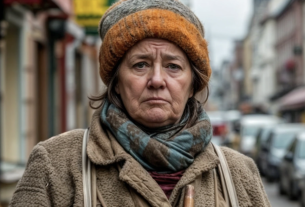He’s not going to make it anyway,” the wife said in a cold, distant voice. “You come yourself and talk to the doctor if you don’t believe me. They have nurses there, all the conditions for him will be met. Well, that’s why they invented palliative care, everyone does it…”
Ilya was born two months premature and was immediately taken to intensive care. At first, they said nothing, then some hope appeared — he started breathing on his own and began to gain weight. When he was discharged, he was still so tiny that Vasily was afraid to hold him, worried he might hurt him somehow. But when Ilyusha woke up and quietly cried at night, Inga wouldn’t get up for him, and Vasily had to figure out how to manage. Inga also didn’t want to take him to doctors, saying it was all because of the doctors — after all, she had done all the tests and ultrasounds, and they said everything was fine. But is this fine? Three months old, and he can’t even hold his head.
Vasily made appointments with doctors himself, listened to strange words that made his tongue stick to the roof of his mouth, gave tests with his son, who would close his eyes like a child every time the nurse tried to find a vein. Eventually, he got to the geneticists at the regional center, who explained that Ilya could be helped, but special medicines were needed. That’s why Vasily went to work on the shift — a friend had been inviting him for a long time, the pay was good, but Inga would not let him go. Now there was no other way. He left, thinking the son was with Inga and everything was fine, but it turned out otherwise. And the grandmother didn’t tell him anything, although he felt she was hiding something.
“It’s all right, son, work,” she kept repeating.
As it turned out, it was the grandmother who had been going to the hospital to see Ilyusha all that time — talking to him, applying cream for bedsores, and giving massages. Inga went to work but didn’t tell him. She only confessed when Vasily said he would come for a month’s leave.
“Inga, this is our son!” he protested. “What palliative care? What am I working for? The doctor said there are medicines…”
“What medicines!” Inga screeched. “Have you even seen him? You’ve been gone for six months, so don’t tell me what I should do! I’m still young and want to live for myself. And I can have another child. I don’t want to be a mother changing diapers all my life!”
Inga’s younger brother had polio as a child, and when Vasily met Inga, he admired how fragile and delicate she carried her brother, seated him in a chair, and read books aloud to him. That’s basically why he fell in love with her. But it seemed Inga’s love was enough only for her brother.
“If you don’t take our son home, I will file for divorce,” Vasily threatened.
“Well, go ahead! What a scare tactic! I somehow lived without you all this time and will keep living.”
He didn’t think she would really leave. But Inga left, even before he came back. She gave the apartment keys to his grandmother, who had long suspected everything but didn’t tell Vasya — during those six months, Inga had found someone to move in with.
“Don’t worry, son, we’ll manage. I’ll help you with Ilyusha, but you’ll have to find work here — I can’t handle him alone.”
Vasily understood that himself — grandmother had been ill for a long time and needed care herself, but he couldn’t repay her debt; he couldn’t split himself in two.
Vasily was raised by his grandmother. His mother, a fairly successful singer, brought him to his grandmother for a month but never took him back. She sent money regularly while he went to school, but then, apparently, decided it was enough and that he could manage on his own. In his youth, he thought his mother loved him, it was just that her life was complicated: concerts, filming, fans… He even went to her concert himself — bought a huge bouquet of roses, dreamed about giving it to her, how she would recognize him and be happy, how she would say from the stage, “This is my son!”
But it turned out differently: at first, she didn’t notice him for a long time, then finally took the bouquet without even looking at it and threw it somewhere in the corner. Vasily had spent almost all his salary on that bouquet. After the concert, he barely got backstage, tried to explain he was her son, but she didn’t let him in. She told him she was tired and would call back. He waited for her call for a month, never leaving the phone. But she never called.
Now he didn’t even remember her, and if her song played on the radio, he switched it off immediately, not wanting to listen, though before he knew all the words by heart. Grandmother was both a father he never knew and a mother to him. And now she had become a mother to Ilyusha — she looked after him as best she could, and Vasily got a job with a normal schedule so that grandmother wouldn’t get too tired. Inga didn’t even call, worse than his mother — at least she sometimes pretended she had a child.
“Vasya, I had such a vivid dream today,” grandmother once said. “Your grandfather, may he rest in peace, asked me to bring him water from the well. I said, ‘How can I carry it? My legs don’t work!’ And he said, ‘Everyone here can walk.’ I looked, and the grass beneath my feet was so green! And soft, like down. I walked on it, and my legs slid and didn’t hurt at all! I drew water and, at the end, looked into the well. I see you in a suit and tie, and next to you a nice girl, with dimples on her cheeks. Wearing a veil. I feel this dream means you will find yourself a good wife, not this flirty one!”
“Grandma, what wife! If the birth mother didn’t want to take care of Ilyusha, who will?”
The next day grandmother didn’t wake up. So the dream must have meant something else — now she’s bringing water to grandpa, not to little Ilyusha.
Vasily didn’t know what to do now. His mother helped with the funeral, even came herself, but still they had to spend money, which was embarrassing to ask her for. But after a couple of weeks, mother called and said:
“I found a nurse for your son. I’ll pay her, don’t worry.”
Such generosity surprised Vasily, and at first he wanted to refuse, say he didn’t need anything from her, but he changed his mind — now there was no time for pride when his son was running out of medicine.
For some reason, he expected a mature, experienced woman — he had seen many like that in hospitals while taking Ilyusha, all resembling his grandmother in youth — businesslike, simple, knowing their job well. But apparently, mother decided to save money again — she sent some recent graduate, a girl who immediately admitted it was her first job.
“Don’t worry, I’ve taken special courses and can do everything,” she said briskly, though her voice trembled.
He could have called his mother and told her this girl couldn’t cope with Ilyusha, but he didn’t want to talk to her at all. So Vasily decided to wait and see if those courses were actually good for something.
The girl’s name was Marina. And she called him every half hour.
“Vasily Petrovich, is it normal that he hiccups?”
“Hold him upright. And put something warm on his back, you can heat a towel with an iron.”
“Vasily Petrovich, he’s breathing so hard, I’m scared!”
“Marina, the inhaler, I told you…”
And so on like that.
But after a couple of weeks, she got the hang of it and seemed to manage better. Although Vasily had to get another job — her working day ended at six, and he still had to get back. He had to go to construction; the schedule was flexible, but all under the table. They promised good pay, but when…
Now Vasily spent his weekends with his son — that girl couldn’t even work weekends for extra money, because she was learning Chinese. She babbled about wanting to go on an internship there to study acupuncture. Marina was funny, naive — not like his grandmother, who always trusted the TV, but this one trusted the internet.
On Ilyusha’s birthday, however, Marina came on a day off — brought him a balloon, which he loved very much, and a hand-knitted jumpsuit. Vasily was touched and invited her for tea — he bought a cake for the occasion. Then they all went for a walk — they dressed Ilyusha in the new jumpsuit, put him in the stroller, and tied a balloon to it so he could watch. Vasily understood his son might not live to the next birthday, and it was hard to breathe thinking about it. But at the moment when he was pushing him down the sunny street and the balloon tried to rise in the light autumn breeze, he felt good inside.
He noticed Inga late, only when they stopped at the crosswalk did his gaze catch her painted-up face. Her girlfriends were standing nearby, apparently going to some event. Inga didn’t notice him at once either, her face flushed and covered with spots. She turned away, said something to her friends, and hurried to the other side of the street.
“Who’s that?” Marina asked, noticing his tense look.
Vasily slowly exhaled and replied, “No one.”
“Well, good,” she said and smiled.
He had never seen her smile before. Dimples appeared on Marina’s cheeks, and that somehow reminded him of something, but what? The blue balloon against the blue sky fluttered just as strongly as his heart.
They never paid his salary. The medicine was running out, and Vasily had no way out — he had to call his mother.
“Am I not helping you enough?” she asked irritably. “Do you know how much I pay that girl? What kind of man are you that you can’t earn money for medicine?”
Vasily was so ashamed he even lost his breath. Was he really unable to provide for his son? He hung up and lowered his head — he wanted so much for grandmother to come now, put her hand on his shoulder, and say everything would be all right…
Light footsteps were heard, and Marina appeared at the kitchen door. She held an envelope in her hands.
“Here,” she said, putting it on the table.
“What’s this?” Vasily didn’t understand.
“This is for the medicine. For Ilyusha.”
He couldn’t understand what it all meant.
“Your mother paid me. She paid well, don’t think otherwise. I was saving for a trip to China, but now I don’t need it — I live with my parents, I have everything.”
“But what about your trip…” Vasily was confused.
Marina shrugged.
“Well, where am I going now…”
She shyly smiled, and the dimples reappeared on her cheeks. Vasily suddenly remembered grandmother and her dream. And blushed to the roots of his hair, not understanding why.
“Take it,” she said firmly. “That’s the right thing to do.”
“I’ll pay it all back,” Vasily croaked, coughed, and asked, “Since you’re not going to China, maybe you could come visit us on the weekend? We could go for a walk like last time…”
Marina smiled again and replied, “With pleasure…”



